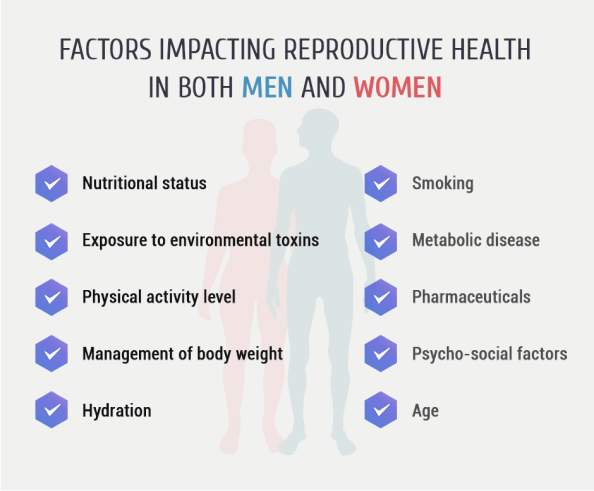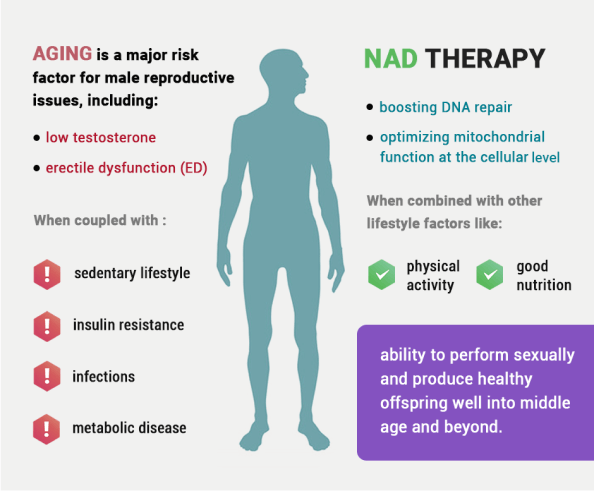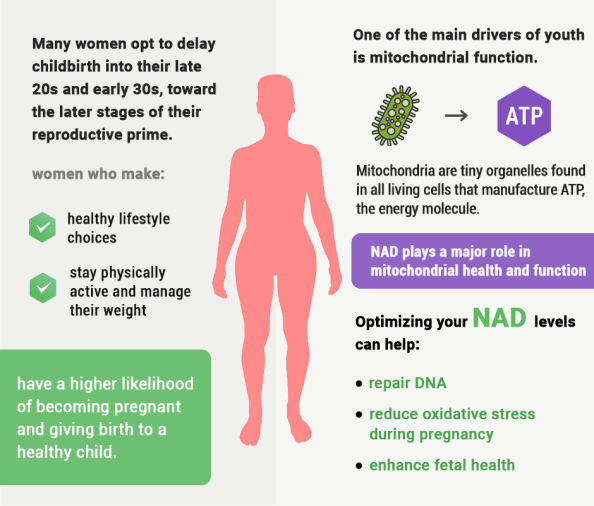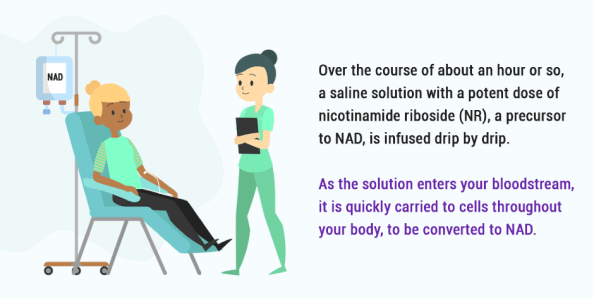
One of the major hallmarks of aging in both men and women is a decline in reproductive capabilities, which in turn is driven by diminished levels of certain metabolic factors over time. One of the key factors associated with aging and reproductive health is nicotinamide adenine dinucleotide (NAD), a coenzyme found in all living cells.
As humans age, cellular NAD levels decline, impeding the reproductive process and inhibiting other metabolic processes that are vital for optimal health. NAD IV therapy can help to slow the aging process and replenish cellular NAD levels, to restore libido and enhance sexual performance. In addition, optimal NAD levels can improve adult fertility and enhance sperm and egg quality, for improved odds of conceiving a healthy fetus.
Aging and Reproductive Decline
Both men and women become capable of reproducing at puberty, and most remain highly fertile through their 20s and into their early 30s. But many factors can influence fertility and reproductive health, even in younger people.
The primary factors impacting reproductive health in both men and women include:

- Nutritional status
- Exposure to environmental toxins
- Physical activity level
- Management of body weight
- Hydration
- Smoking
- Metabolic disease
- Pharmaceuticals
- Psycho-social factors
- Age
Biologists agree that the primary objective of all living organisms is to reproduce. Humans enjoy a relatively long reproductive lifespan, lasting up to 30+ years for women and even longer for men. But many things can impact your reproductive health, most of which are manageable and even reversible.
The anti-aging properties of NAD may help to enhance your reproductive capabilities through multiple pathways. In addition, people with high levels of NAD are found to have higher quality sperm and ova, thus creating healthier, more resilient offspring.
NAD and Male Reproduction

Aging is a major risk factor for male reproductive issues, including low testosterone and erectile dysfunction (ED). When coupled with sedentary lifestyle, infections, insulin resistance, metabolic disease, stress and sleep apnea, male reproductive capacity can take a serious nosedive.
In addition, older age leads to shrunken testes and changes in the shape and mobility of sperm, with a higher risk of genetic defects. Men who optimize their health with physical activity, a nutrient-dense diet and good sleep hygiene are less likely to experience ED, tend to have better libido, and are more likely to produce healthy sperm.
NAD therapy helps to foster improved male reproductive health by boosting DNA repair and optimizing mitochondrial function at the cellular level. When combined with other lifestyle factors like physical activity, weight management and good nutrition, men can influence their ability to perform sexually and produce healthy offspring well into middle age and beyond.
NAD and Female Reproduction

Like men, women become fertile at the onset of puberty, but many women opt to delay childbirth into their late 20s and early 30s, toward the later stages of their reproductive prime. As with their male counterparts, women who make healthy lifestyle choices, stay physically active and manage their weight have a higher likelihood of becoming pregnant and giving birth to a healthy child.
One of the main drivers of youth is mitochondrial function. Mitochondria are tiny organelles found in all living cells that manufacture ATP, the energy molecule. NAD plays a major role in mitochondrial health and function. In addition, NAD is responsible for the repair and production of DNA. Damaged DNA is linked to infertility, miscarriage and gestational complications in pregnant women. Optimizing your NAD levels can help to repair DNA, reduce oxidative stress during pregnancy, and enhance fetal health.
NAD Treatment for Reproductive Health
Whether your goal is to improve your sexual performance or enhance your chances of conceiving a healthy child, NAD IV therapy can help to boost NAD levels, to repair DNA, boost mitochondrial function, enhance sperm and egg quality and prolong your reproductive years.
During your NAD IV therapy session, a skilled clinician will thread an IV needle into your arm as you relax in a comfortable recliner. Over the course of about an hour or so, a saline solution with a potent dose of nicotinamide riboside (NR), a precursor to NAD, is infused drip by drip. As the solution enters your bloodstream, it is quickly carried to cells throughout your body, to be converted to NAD.
When combined with proactive lifestyle changes, regular NAD IV sessions can help to mitigate the negative effects of aging and optimize your reproductive health.

NAD IV Therapy in NYC
The rate at which you age is only partially determined by genetics. Epigenetic factors like nutrition, sleep, physical activity and stress management play a far greater role in human aging, and they are all factors you can control.
InVita Cryo NYC is dedicated to helping you live your very best life with supportive nutritional therapies and cryotherapy. In a world full of junk food, toxins and disincentives to exercise, maintaining peak health can be difficult, but you don’t have to go it alone. Contact InVita Cryo NYC today, and learn more about how NAD, cryotherapy and nutritional IV therapy can help you live a happier, healthier, more productive life.
Resources
Meyer, Ralph G., and Mirella L. Meyer-Ficca. “Metabolism in Male Reproductive Aging.” Advances in geriatric medicine and research 3.1 (2021).
University of Queensland. “Women’s egg quality dependent on metabolic factors.” ScienceDaily. 7 July 2020.
Singh, Shripriya. “Oral metabolic supplementation can reverse the reproductive clock in mice: A potential remedy to restore reproductive aging?.”
Okabe, Keisuke, et al. “Implications of altered NAD metabolism in metabolic disorders.” Journal of biomedical science 26.1 (2019): 34.